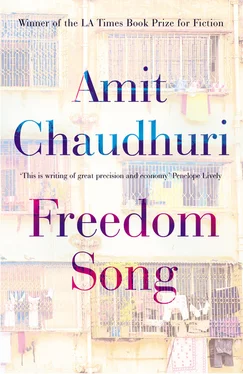In the kitchen, the blue fluorescent light was suddenly extinguished, leaving its doorway dark until a pale, undecided patch of colour appeared in it — Nando, in his white pyjamas and shirt. On his black face, the eyebrows were knitted, either because he could not see well these days, or out of concern or puzzlement over some elusive thing.
‘Hey, you,’ he said.
The two figures stirred as if they had been immersed in something, lifting their heads like cats raising their whiskers from a bowl of milk.
‘What?’ said Jochna, altering her voice to a surprising hardness and volume, for she, among the two, was unafraid of his bully and bravado.
Nando softened.
‘What?’ he returned.
‘What are you saying?’ said Jochna.
‘No, I was only saying — have you washed the pans?’
‘Can’t you see?’ She might have been addressing a hectoring child.
Nando didn’t mind this scolding. As if something had suddenly occurred to him, he turned back to the kitchen. Poor man, he had probably just wanted to have a few words before going in and smoking his bidi by himself in the servant’s room — because he never slept during the day. But the girls kept him out of their afternoon world, to which they had already returned, their sides and shoulders pressed against the carpet till they hurt, their breasts rising and falling lightly. They let no one encroach upon their territory between the sofa and the centre table; if someone did, they got up, flustered and serious. And Nando could not make normal conversation. He either flirted with Uma, standing beside her by the kitchen basin and brushing his shoulder against hers, or they quarrelled loudly, or made fun of each other in small, irritating, uncharitable ways. With Jochna he dared nothing at all, because she bore his daughter’s name, and was just as short with him as his daughter was; in fact he tried to please her whenever he could; but, in that frail demonic body with red eyes and tobacco-stained hands, there also existed a genuine paternal soft spot for Jochna. This was known and accepted in the household.
While these people rested at home, Khuku’s husband sat in an office on the outskirts of the city. It was an old company, once reputable and British owned, called Little’s, and it produced sweets and chocolates. There was a time when its oval tin — Little’s Magic Assortment — was available in every shop in Calcutta, and its toffees and lozenges in cellophane wrappers stored in jars in every cigarette shop. The company had changed hands several times, until now it was owned by the state government, and, after having made losses for many years, was named a ‘sick unit’. Its loyal machines still produced, poignantly, myriads of perfectly shaped toffees, but that organ of the company that was responsible for distribution had for long been lying numb and dysfunctional, so that the toffees never quite reached the retailer’s shelves. Years of labour problems had sapped the factory and its adjoining offices of impetus, but ever since the Communist Party came to power, the atmosphere had changed to a benign, co-operative inactivity, with a cheerful trade unionism replacing the tensions of the past, the representatives of the chocolate company now also representing the government and the party, and the whole thing becoming a relaxed, ungrudging family affair. This kind of company was not rare in the ‘public sector’; in fact, brave little bands of men held out in such islands everywhere; but Khuku’s husband, before retiring, had worked in a successful private company, where every department whirred and ticked from nine to five thirty like clockwork, and he and his colleagues had only heard of the renegade lives of the ‘public sector’ companies from the outside. They were spoken of as backward but colourful tribes with a time-tested culture of tea-drinking, gossip, and procrastination, who had stoutly defended, for many years, their modes of communion and exchange from being taken over by an alien ‘work ethic’. Little did he know, then, that, in his days of retirement, he too would end up here. It was, in a sense, a relaxing place to be in, like withdrawing to some outpost that was cut off from the larger movements of the world. The factory was tucked away in a lane on the outskirts, not far from an important and congested junction on the main road, where no one would have expected it, hidden behind stone walls and a huge rusting gate that opened reluctantly to outsiders. Once, the two-storeyed buildings made of red brick, with long continuous corridors and verandas, with arches that were meant to give shelter from the tropical heat, would have been impressive and even grand. Now it was like a hostel; cups of tea travelled from room to room, and bearers ran back and forth in the verandas. There was a perpetual air of murmuring intrigue, the only sign of life, until the doors and windows were shut in the evening.
Yet the employees were, in their own way, simple and good-hearted. And though Khuku’s husband was only an adviser, they treated him with a bit of extra respect and sometimes as if he ran the place. ‘Put it back on the rails, sir,’ they said, ‘we need people like you. What a state the company’s in!’ And Khuku’s husband came home and told Khuku these stories, his eyes shining, and felt young again. And Khuku told her brother in Vidyasagar Road, ‘He’ll put the company right.’ Khuku’s brother, in a kind of infatuated haze, said, ‘Little’s — Little’s will be all right again.’ For many days after, he would not let Piyu or his brother’s children touch Cadbury, and go out himself in search of Little’s chocolates. His relationship would become temporarily strained with the keeper of the local shop, Pick and Choose, who was always doing his accounts on a scrap of paper and was not very concerned about human beings. ‘What, sir, you don’t keep Little’s toffee— we ate it when we were young. You must have eaten it as well. No, this shop is not what it used to be,’ he would conclude, shaking his head. ‘What can we do, Bhola babu?’ the shopkeeper would say. ‘They don’t send us the chocolates,’ as if he were speaking of a powerful but heartless family.
Meanwhile, Khuku’s husband had discovered that, in spite of their good intentions, the employees, after making their supportive and rallying statements, went back first thing to a convivial round of tea in the canteen. So he resorted to saying, ‘Do it at once!’ or ‘I want some order in this place!’ till he knew better. A few weeks later, he met, at last, the Managing Director. The Managing Director had joined the company three months ago, but since he was a state civil servant as well, he naturally could not spend all his time here — he was merely a stop-gap before a full-time man came along. ‘Pleased to meet you, Mr Purakayastha,’ he said to Khuku’s husband. ‘I’ve heard so much about you — we are very fortunate, very fortunate. We need your skills, sir. Tell me — are you happy with your office?’ A new room had been refurnished specially for him, with a filing cabinet, a telephone, and a window that looked out over the wall into the lane. ‘Oh yes, you shouldn’t have gone through the trouble,’ said Khuku’s husband. ‘No trouble, no trouble at all! In fact, you’re the one that’s going through the trouble,’ he said, waving around him. ‘No, no,’ said Khuku’s husband. ‘In fact, Mr Sengupta, I would like to have a talk with you.’ He smiled and looked seriously at the other. ‘Definitely, Mr Purakayastha. We are very keen to hear what you have to say. Definitely.’ Yet the Managing Director — a relatively young man — spoke like one who would not be around for long, for all Managing Directors used this company as a kind of airport lounge, from where they went on to somewhere else, never to be seen again. And so it was the eager tea-drinking employees that Khuku’s husband spent most afternoons with.
Читать дальше












